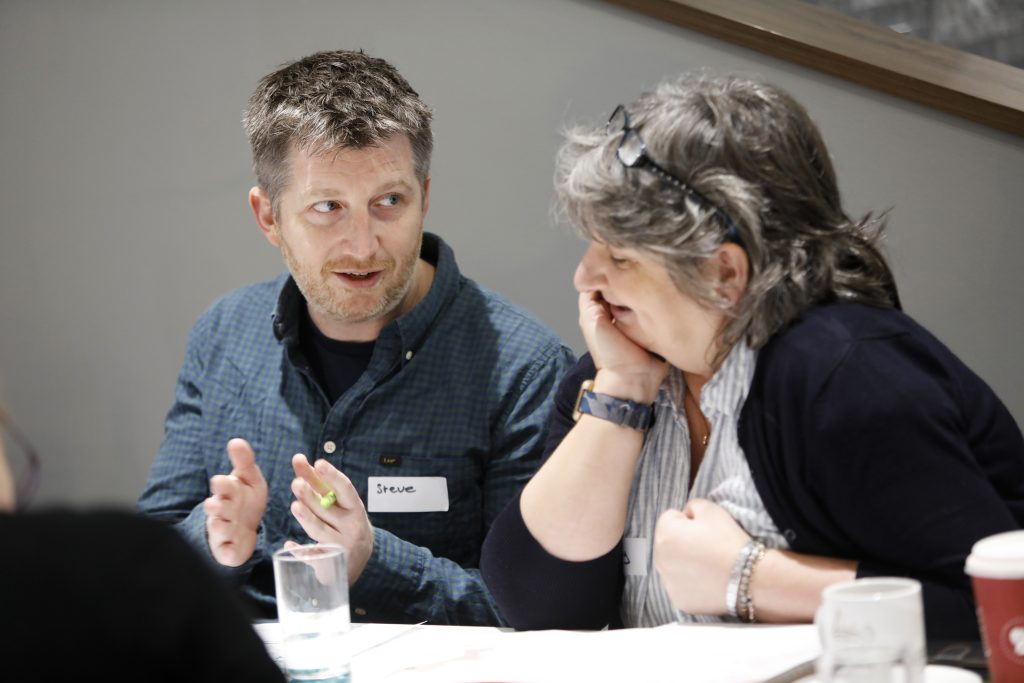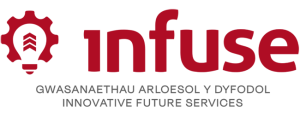
Source: Infuse Reports from Steve Davies (Vale of Glamorgan) and Sally Harvey (Caerphilly).
Case study title: Tackling complex challenges in Social Care and Health
Infuse Cohort: Three
Council/organisation: The Vale of Glamorgan Council and Caerphilly County Borough Council.
Context
The first three Infuse cohorts were recruited to work specifically on challenges relating to accelerating decarbonisation or supportive communities. For our final cohort, we decided to make one addition. We put out a call for social care professionals to join the programme to focus specifically on Attracting, Recruiting and Retaining Great People in Social Care and Health. Four individuals with varying roles from three different organisations answered the call, working together to make a significant impact on the overarching goal. While each participant in the group developed a different innovation experiment, all were complementary, interlinked and benefited greatly from the collaborative group approach.
This case study focuses in particular on the work of two of those professionals – Sally Harvey, a Childcare Investment Support Officer at Caerphilly County Borough Council and Steven Davies, a Social Care Workforce Development Regional Project Officer at Vale of Glamorgan Council. One of our main objectives in setting up the Infuse programme was that it would take aim at some of the most complex challenges facing the region,and both Sally and Steve’s experiments are doing just that.
Sally Harvey, Investment and Business Support Officer, Caerphilly County Borough Council, talks about her time on the Infuse programme.
Steve Davies, Regional Project Officer at the Vale of Glamorgan Council shares his Infuse story.
What was the overarching challenge?
Staff shortages are prevalent across many parts of the care system in Wales. From social workers to domiciliary care staff and from childcare settings to residential care homes, local authorities and the providers they work with are struggling to maintain staffing levels sufficient to meet local demand.
The issues are complex, with many potential avenues to explore – pay, running costs, staffing ratios, qualification requirements, legislation, workload, mental health to name just a few.
Which aspects of the challenge were addressed in the experiment (the research question/s)?
Sally initially considered developing an experiment exploring the lasting impact of COVID-19 on the sustainability of the childcare sector (many workers left the sector, in some cases moving into sectors like retail, where pay is similar but responsibility is significantly less). As she engaged with others in the group, it became clear that a shift in focus would allow her to contribute more meaningfully not only to the learning of the group, but to an assessment of the longer-term health of the sector. The research question she chose to explore is:
Will the childcare sector infrastructure in Wales be able to accommodate the rising need for childcare especially, if like in England, free childcare is extended to 9-month-olds in 2025?
With the sub questions:
How will the economy – rising cost of living, interest rates, wage rises – affect the sustainability of suppliers?
Will there be enough new staff coming through to maintain current staffing levels and meet any increase in future demand?
Steve joined Infuse having already developed a good understanding of some of the issues surrounding social care recruitment, and an idea about what he’d like to test in trying to overcome them. A lack of staff in the sector means that providers are becoming increasingly reliant upon private-sector care agencies, which are able to charge inflated prices to supply staff, diverting funds out of the sector and into company profit sheets. Benefiting from the opportunity to work with others in the sector to refine and further develop his idea, Steve chose to explore the following research question;
What is the potential for a Council-sponsored, not-for-profit recruitment agency to help overcome staff shortages in the care sector in Wales?
With the sub-question:
Would this allow social care funding to circulate within the social care sector in the form of better terms and conditions and improved training, rather than being extracted to private sector companies?
What was done to address the challenge?
One of the tools we relied upon heavily throughout the programme is Nesta’s continuum of experimentation. This would allow programme participants to orient themselves and their level of understanding on a spectrum between ‘solutions are unknown’ and ‘solutions are known’, designing an experiment appropriate to how well understood the problem was already and how they could best move this understanding forward.
Sally and Steve fell at different points on the continuum, with Sally firmly in the ‘explore/generating a hypothesis’ space, having settled on a different challenge to the one she had thought she would take forward. Steve was further along on the spectrum at the trial and error stage, ready to take action to find out what works and why.
Sally’s experiment took the form of ‘horizon scanning’ – a futures technique that seeks to detect future threats/opportunities early on – with a view to informing future policy decisions. Focusing in particular on trend analysis, Sally sought to capture data that would help her to predict future growth in demand, and how well-prepared the sector would be to meet it.
Steve’s idea will require buy-in from across the Council, so he spent much of the ‘test’ phase of Infuse working with the Vale of Glamorgan Council’s Head of Strategy, Trevor Baker, on developing a concrete proposal. This will now be taken to key stakeholders in the council – for example the legal and HR teams – to generate that buy-in.
Which aspects of Infuse were most helpful in addressing the challenge?
Sally and Steve both identified that the data lab had been particularly impactful for them. It prompted Steve to think about the different value that qualitative and quantitative data each bring, and helped Sally identify the data she really needed from within a huge range of potential datasets. Sessions on creating a pitch to gain buy-in were particularly helpful for Steve, fitting perfectly with the immediate task at hand in moving his idea forward. Steve also spoke at length in his Infuse report on the impact of the Infuse journey overall on his way of thinking and approach to problem-solving:
- Stimulates creativity and innovation: Working in an environment that fosters innovation encourages individuals to think outside the box, explore new ideas, and propose creative solutions to complex issues. Collaboration with a diverse team from different LA’s and sectors helps to bring fresh perspectives and encourages a culture of innovation. I had an initial idea / plan of what I wanted to achieve before the programme but the people I’ve met from different LAs and the Infuse team have really helped me develop my idea in ways I wouldn’t have even thought of unless I attended the programme.
- Challenges traditional thinking: Innovation and collaboration challenge the status quo and encourage participants to question existing practices and explore unconventional approaches. This mindset shift can be both exciting and challenging. It required us as participants to step outside of our comfort zones and embrace new ways of thinking. Being relatively new to the work of working in a LA environment I think falling into the trap of doing the same old, same old way of thinking is quite easy and natural to do. The Infuse programme has made me realise that I should hang on to my ‘untraditional’ way of thinking and see it as a benefit rather than something that I need to change.
- Enhances problem-solving skills: The collaborative nature of the programme enabled us as individuals to tackle challenges collectively. By leveraging the diverse expertise and knowledge of team members, participants can develop effective problem-solving skills and identify innovative approaches to overcome obstacles. There are many issues that I have come up against with my project and the programme has helped me to address these and has given me the skills to address, hopefully, any other issues that will surely arise as I progress my idea.
What were the main lessons from collaborative working?
Over the course of Infuse, the programme delivery team has noted two types of collaboration between associates; collaboration in learning and collaboration in doing. Much of the collaboration that has taken place during the programme has been the former – collaboration in learning, where participants have faced a shared challenge, but have come up with different ideas for solutions that they would like to test in their context, shaping one another’s ideas, and collectivising their learning. This is the way that the social care group worked, and Steve and Sally both felt their work was stronger as a result of this way of working.
“Our group with Steve, Gaynor, Lisa and Owen were a great help in making contacts and steering me on my journey.” Sally
“Being able to discuss my ideas and find out how other organisations work has been and will be pivotal in how to grow my experiment. I think I was also able to provide some of my own experience in helping other people develop their ideas too.” Steve
Key findings
Sally’s horizon-scanning exercise enabled her to draw several conclusions directly relevant to her research question:
- Staff Recruitment and retention issues. Evidence suggests that there will be a staff shortage of qualified staff to work in settings, as recruitment at present is proving very difficult for settings to be able to find the right qualified staff to take on due to NMS Standard restrictions and if there is an expansion of free childcare for younger children then settings will need more staff due to staff ratios.
- Number of Childcare places. At present settings are able to offer enough spaces that are needed but if a roll out of further Free childcare does come in then there will not be enough places to potentially offer all those looking for them, more Day Nurseries and Childminders are needed to cope with possible demand for childcare from aged 9 months.
- Qualifications. If Wales is to follow England with the expansion for 9-month-olds, a decision would need to be made and time given for the sector to prepare the infrastructure of the sector to cope with the possible demand they will face. With the lead times for gaining qualifications new staff can take between 3-4 years to complete a Level 2 and Level 3 qualification.
- Start-up costs. Welsh Government need to put support in place to help new providers set up as the start-up costs for a Nursery setting are up front costs which can’t be recouped until at least 6-12 months, due to the time it takes to refurbish premises to meet National Minimum Standards and then get registered before places generating income can be offered.
For Steve’s non-profit recruitment agency idea, a key finding is that while the story of what’s happening in the sector might be enough to convince some potential stakeholders, for others, a clearer business model, with concrete evidence of ‘the size of the prize’ will be necessary. Initial conversations seem to indicate that he has rightly assessed the nature of the problem – recruitment and retention issues leading to heavy reliance on recruitment agencies, which can and do charge ever-increasing rates for staff due to ever-increasing demand, and that this problem is likely to keep growing.
Next steps
Steve plans to collect more data through surveys and focus groups with care agencies to discover what they’re looking for in a recruitment agency, to inform his business plan. In addition there is a need to identify the business model that will form the experiment as his initial idea of a local authority trading company (LATC) is not an option and would limit the idea.
“The next few months are going to include a lot of hard working. But that work and the skills learnt in infuse I will hopefully be able to influence those people around me to move my experiment forward”

Steve Davies
Regional Project Officer, Vale of Glamorgan Council.Having completed her horizon scan and identified some key issues, Sally has begun exploring what steps she can take to move things forward locally. She has made contact with WeCare Wales and the Caerphilly CBC Employability Team to see if they can work together to offer support with any Caerphilly participants on their Introduction to Childcare courses. This would allow learners to receive follow up help in progressing onto further qualifications if a childcare career is something they want to pursue.
On speaking to Caroline Millington at Oxford House Adult Education Centre in Risca, (also on this cohort of Infuse), and relaying the issues with recruitment of new staff for childcare, she is now going to look at their Education Centre becoming accredited to offer childcare qualifications from their location to the adult learners that access the centre.
“Infuse has not only taught me a great deal but it has helped increase my own confidence in my abilities and made me more able to put my opinions forward and I am hoping to now work more closely with the Childcare team to help the Childcare Sector move forward in these challenging times”

Sally Harvey
Investment and Business Support Officer, Caerphilly County Borough CouncilConclusion
While Sally and Steve carried out two very different pieces of work, they each embraced significant challenges affecting not only their own organisations or localities, but the whole of Wales and arguably beyond. The learning they each produced and the ideas they each generated could, in the hands of the right people, help to move Wales forward significantly in its need to understand and address the recruitment and retention difficulties being faced in both the childcare and domiciliary care sectors. This was our vision for what Infuse would help the public sector to achieve, and although the programme will not continue in its current form, we hope that organisations across CCR and beyond will read our handbook and use the tools it contains to continue to tackle these complex, enduring challenges and create the kinds of change we so desperately need.

